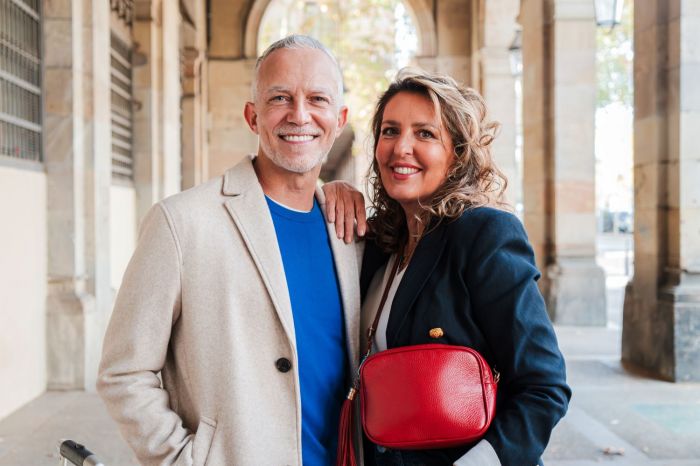
1. It is a great time to buy!
Falling house prices in many areas have meant that there are now some real bargains to be had.
2. You're not the only one buying.
With house prices much lower, investors are swooping in to compete for high spec properties at a fraction of the price they were sold at just a few months/years ago.
3. Keep your eye out for a bargain but remember, not all sellers are desperate.
It tends to be wealthy people that own wealthy homes, and not all sellers are desperate to get their hands on cash straight away - it may be that for the perfect home you still need to pay asking price, or above if there are other interested parties. This really depends on the specific property and how its value has changed compared to the rest of the market in that particular area.
4. Upsizing? You may well have to sell at a discount, but it's all relative.
Unfortunately moving away from a home you've built maybe over several years and accepting it has a lower value can bring with it a certain level of emotion so try and step back to give yourself the clarity for the best decisions. In today’s world, its often possible to sell low, buy even lower. Even if you have to sell for less than you want, chances are you'll still come out with a great deal if you have the time and patience to find it. And then once you realise you may get more for your money, selling undervalue can be much easier to take.
5. Define what exactly you want - Get your priorities straight.
It's important to make sure you know you're making the right decisions along the way, whether that be to do with moving in the first place, or in relation to the size/style/location of the property itself. The most successful purchasers often have an intellectual or physical checklist for their dream home. Remember though, however specific you are it is usually a gut feeling about a property that helps you make the important decisions - so try hard to keep the head and heart aligned!
6. Determining value.
One of the toughest things to establish is the realistic value of the properties you're buying and selling. It's only worth what someone is prepared to pay - for example there's no point giving your home a £2million price tag if no offers hit the table. Some areas have seen huge drops in value, where others have seen no major changes in price at all. To help you understand how the house is positioned in the current market, consider the following:
- get a professional opinion and invite several different estate agents over to provide an approximate but realistic sale price.
- Check websites like Zoopla or Mouseprice (or the equivalent depending on what country you live) for a rough guideline, using their estimates. Bare in mind however, these tend to use the property's most recent sale price (which could be 10-20 years ago), and they use comparable properties within the local area based on a postcode and number of bedrooms. Many of these online details can be inaccurate, but of course the majority of luxury homes are also unique, making the use of comparables difficult. It could be that a luxury property situated local to less pricey areas, provide a very undervalue estimate. It is however, a good place to start. (Mouseprice usually has a great description and explanation section for most properties).
- on these sites, it may be helpful to dig a little deeper yourself and find similar properties that have sold more recently, rather than taking their estimate as final. If you know the area, great. Look for comparable properties on similar streets that have sold within the last 3-6 months.
- when buying, a mortgage lender will insist on at least a basic level professional valuation. When selling, despite no requirement, it may also be a good idea to consider instructing an independent valuer. Estate agents are helpful if you're wanting a free estimation and an idea of realistic sale price, however remember they are working on commission, which may bias the valuation in an attempt to win your business.
- If selling, your estate agent will come and value your property for free, both to establish a realistic price for you, and to scope out the potential business for them. Because this tends to be based on local knowledge, it might be best to consider using a local agent, with knowledge of the area.
7. When shopping around, consider using a specialist.
Look for an agent, valuer, and/or mortgage broker that specialises in luxury, high end properties. It is not impolite to request this, and in fact, questioning and interviewing your agent on their experience beforehand can be a great way of working out if they are right for you. Developing a trusted relationship from the start will not only make the process less stressful, but will make sure they know exactly what you're looking for, so you're top of their list when any new properties are ready to come onto the market, or if there’s any further price reductions on existing listings.
8. Get the right finance together early.
If you require a mortgage to fund some of the purchase, it would be prudent to search the market for the best deals - especially important if you're borrowing a large amount, where small changes in interest rate can have a huge impact on your monthly payments. There are literally hundreds of deals out there, some have no fees and slightly higher rate, some come with a fee and a better rate – it’s the brokers job to find you the best one. They'll usually get paid commission by the lender, but nowadays it’s negligible and often barely covers costs, so unless you take insurance with the mortgage too, you may be charged a small fee for the service.
Be sure not to pay too much however! Broker fees range anywhere from 0 - 3% of the loan so make sure you're not being ripped off! If the mortgage is tricky to place then expect to pay a higher fee, The great thing is that with a luxury property, you will have an abundance of brokers to choose from so make sure you shop around and get quotes off a few to ensure that you get the maximum return on investment.
9. Cash buyers fare better.
In recent years, it is thought that more luxury home purchases have been made by cash buyers than ever before. This may not be just because of restricted lending solutions, but possibly because of the perceived difficulty of selling in general - vendors are seeking the quickest and easiest turnaround, and cash buyers have the advantage of not needing to please a lender, wait for funds to be released or another property to be sold elsewhere. Not being part of a chain holds great value for a purchaser, and can assist in negotiations to drive down the price.
10. Think long term for the highest capital gains.
For many investors, the feeling is that the recovery of the housing market and the economy in general, is going to be a relatively slow one. They are thinking long term, often decades into the future, about how good a return they'll get on the property.
11. Maximise potential re-sale value.
Remember every potential investment carries certain risk, but in an unpredictable market there are a few core things to keep in mind that can help your purchase keep its value:
- Location, Location, Location.
Is the property commutable to the major local city, School, work, airport? The decorating can be changed in weeks, the location is permanent and a property in the right place, of a value suitable for the area, can be one of the most important factors to consider.
- Think green.
People are growing ever more aware when it comes to Energy and the environment, as well as using eco efficient features to save money. So don't forget the re-sale potential of your new property can be improved by ensuring the basics are there - sealing and insulation, electrics, solar panels, water saving/collecting tools, ventilation, and energy efficient appliances.
- Unique features.
Tend to be a double edged sword when thinking about resale. A renovated castle, stables, or maybe a glass built building maybe appealing to some, off putting to others. Its easy to fall in love with a property in the short term, but before leaping in take a moment to consider the location and the potential pitfalls of a unusual feature or architecture in that area. If you are searching specifically for a unique property or feature, then specialist estate agents exist that may have listings other mainstream agents don't.
12. Buying properties abroad.
How homes are bought and sold can vary drastically country to country. Buying in Scotland is different to the rest of the UK, buying in Spain more so. In USA it can even be completely different depending on the state in question. The titles may differ along with the taxes and charges, and how and what time you make an offer and commitment to buy, or how and when your deposit is paid. A good agent and mortgage broker will inform you of the process, so make notes and be sure you understand before parting with any cash or making any commitment.
Lucy James writes for http://www.onlinemortgageadvisor.co.uk, specialising in clients that aren’t after the more typical types of mortgage. Whether bad credit, homes abroad, investments or luxury property, we can help. If you would like to email Lucy directly about a mortgage, just send an email to enquiries@onlinemortgageadvisor.co.uk and address it to Lucy. Be sure to mention that you came from this website and we will make it a priority to get back to you as soon as possible.

















